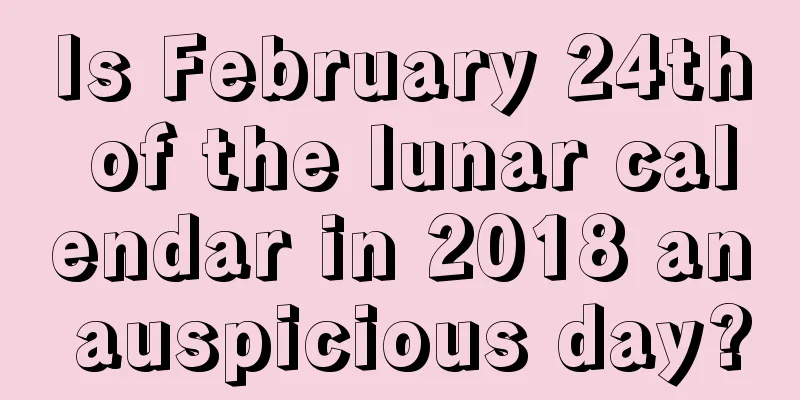What is the date of the eighth day of the twelfth lunar month in 2019? Is it okay to do a spring cleaning on Laba Day?

The eighth day of the twelfth lunar month every year is commonly known as the "Laba Festival". People eat Laba porridge on Laba Festival. So what is the date of the eighth day of the twelfth lunar month in 2019? Is it okay to do a thorough cleaning on Laba Festival? Mr. Shui Mo website has carefully compiled detailed information about the twelfth month of the lunar calendar in 2018. Come to Mr. Shui Mo website!What is the date of the eighth day of the twelfth lunar month in 2019?December 8, 2018 (Lunar calendar)January 13, 2019, Sunday, Capricorn (solar calendar) 【Today’s lunar calendar is suitable】 Pray for blessings, get married, move, bring in wealth, move into a new home, install a bed and make a stove, accept marriage proposals, build houses, fast and offer sacrifices, take up a post, seek offspring, erect pillars, raise beams, plant crops, bring in livestock, catch animals, and go to school. [Today’s taboos in the almanac] Repairing graves, burying people, opening warehouses, drilling, and breaking ground on meridians. Laba Festival is on the eighth day of the twelfth lunar month every year. On that day, people will eat traditional foods such as Laba porridge to celebrate. This custom has a long history in our country. People will go to more famous temples to worship gods in order to ward off evil spirits and pray for peace for their families for the whole year. Is it okay to do a thorough cleaning on Laba Festival?Generally, you can do a thorough cleaning. In some places, you may have to wait until after the 23rd day of the twelfth lunar month to start the thorough cleaning . However, the customs in each place are different, and it is normal to have the custom of thorough cleaning on Laba Festival.What is the origin of Laba porridge?The first theory: Laba Festival is the eighth day of the twelfth lunar month. It originated in the late Yuan Dynasty and early Ming Dynasty. It is said that when Zhu Yuanzhang was imprisoned and suffering, it was a cold day. Zhu Yuanzhang, who was cold and hungry, actually dug out some red beans, rice, red dates and seven or eight kinds of grains from the rat hole in the prison. Zhu Yuanzhang cooked these things into porridge. Because that day was the eighth day of the twelfth lunar month, Zhu Yuanzhang named this pot of multi-grain porridge "Laba porridge". Enjoyed a delicious meal. Later, Zhu Yuanzhang pacified the world and became the emperor. In order to commemorate that special day in prison, he designated that day as Laba Festival and officially named the multi-grain porridge he ate that day as Laba porridge.The second theory: The founder of Buddhism, Sakyamuni, was originally the son of King Suddhodana of Kapilavastu in northern ancient India (in present-day Nepal). Seeing that all living beings were suffering from birth, old age, sickness and death, and being dissatisfied with the theocratic rule of the Brahmins at the time, he gave up the throne and became a monk. He achieved nothing at first, but after six years of asceticism, on the eighth day of the twelfth lunar month, he attained enlightenment under the Bodhi tree and became a Buddha. During these six years of asceticism, he only ate one grain of hemp and one grain of rice every day. Later generations did not forget the suffering he endured, and ate porridge on the eighth day of the twelfth lunar month every year to commemorate him. "Laba" became the "Buddha's Enlightenment Day". "Laba" is a grand festival in Buddhism. Before liberation, Buddhist temples across the country held Buddha bathing ceremonies and chanting sessions, and imitated the legend of the shepherdess offering gruel to Sakyamuni before he attained enlightenment. They cooked porridge with fragrant grains and fruits to offer to the Buddha, which was called "Laba porridge." Laba porridge was given to disciples and believers, and it later became a folk custom. It is said that before the eighth day of the twelfth lunar month, monks in some temples would hold bowls and beg for alms on the streets. They would cook the collected rice, chestnuts, dates, nuts and other ingredients into Laba porridge and distribute it to the poor. It is said that after eating it one can get the blessing of Buddha, so the poor call it "Buddha porridge". The third theory: Laba Festival comes from the custom of "beating ghosts with red beans". Legend has it that Zhuanxu, one of the Five Ancient Emperors, had three sons who turned into evil ghosts after their death and specifically came out to scare children. In ancient times, people generally believed in superstitions and were afraid of ghosts and gods. They thought that strokes, illnesses, and poor health among adults and children were all caused by plague ghosts. These evil ghosts are not afraid of anything in the sky or on the earth, but they are afraid of red beans, hence the saying "red beans can fight ghosts". Therefore, on the eighth day of the twelfth lunar month, people cook porridge with red beans and adzuki beans to get rid of epidemics and welcome good luck. |
<<: What day is the twelfth day of the twelfth lunar month in 2018?
Recommend
What are the do's and don'ts on September 12, 2019?
September 12th of the lunar calendar in 2019 is a...
Is it a good idea to pick up the car on February 27th of the lunar calendar in 2018?
Winter has gone and spring has come. February in ...
Is today’s lunar June 12, 2019, an auspicious day for funerals and burials?
Introduction: Funerals also need to be arranged on...
Is it good to be born a girl in Xiaoman in 2022? At what time is it best to be born?
Whether a girl's fate is good or not depends o...
What is the position of the God of Wealth on the fourth day of the third lunar month in 2022? Check the position of the God of Wealth today
Where is the God of Wealth on the fourth day of th...
Is it safe to give birth to a boy in the Great Heat of 2020? Is it safe to give birth to a boy in the Great Heat of 2020?
Introduction: Children born on different days have...
What day is the sixth day of the twelfth lunar month in 2019?
What day is the sixth day of the twelfth lunar mo...
What is the zodiac sign of people born on the 29th day of the first lunar month in 2018?
Constellations are one of the indispensable compon...
Can I move house on the third day of the eighth lunar month in 2018?
The eighth month of the lunar calendar is also ca...
Is the character and destiny of a boy born on November 26, 2021 in the lunar calendar good or bad?
In fact, everyone is different. Everyone has his o...
Is it okay to pray one day after the third solar term on the sixth lunar month of the Gengzi Year of 2020?
The Great Heat solar term is the hottest solar ter...
Is May 25th of the lunar calendar in 2021 a good day? Is it suitable to go to the temple to pray?
People believe that the fifth month of the lunar c...
What is the meaning of the summer solstice? Can’t eat dumplings during the summer solstice?
The summer solstice is the earliest solar term to ...
When is the Great Cold in 2020? Analysis of the fate and fortune of people born in Dahan
The Great Cold is the last solar term among the 24...
Is the seventh day of December 2020 an auspicious day? Is it suitable for opening a business?
When the twelfth lunar month comes, the winterswe...









